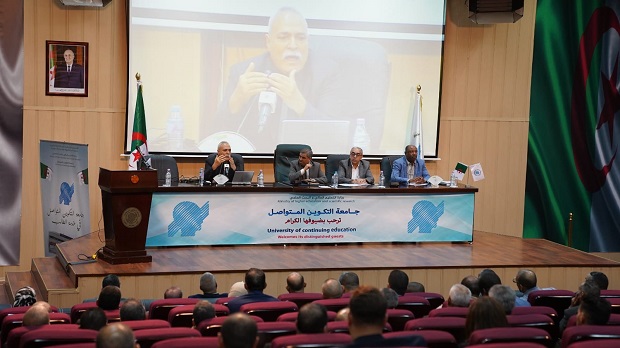
Organization of a Scientific Seminar at the University of Continuous Training
The University of Continuous Training
Ethics and University Morality: The Subject of the Scientific Seminar
The University of Continuous Training organized a scientific seminar on Saturday, November 18, opened by its rector, Professor Yahya Jafari, in the presence of the General Inspector of the Ministry, as well as some university rectors, ethics committee heads in some universities, and some social partners, in addition to some professors, employees, and students of the University. The seminar addressed the ethical code and professional ethics in higher education and research, and it was scheduled to start at 6:00 pm and lasted for more than two hours, with qualitative and diverse attendance from various national entities and university stakeholders.
The seminar included two presentations. The first was delivered by Professor Maqran Abdelhafid, the head of the Ethics Council of the Profession in Higher Education, on the role of local committees in raising awareness and disseminating the objectives of the ethical code. He emphasized the role of these committees in informing university community members about their rights and duties and combating behaviors harmful to the university campus. Professor Maqran provided an overview of the establishment of the university ethics council, which was initiated in 1993, held its first meeting in 1995, and later issued the executive decree forming an advisory body to the Minister of Higher Education and Scientific Research, consisting of 20 professors in 2004. This body works based on the minister’s recommendations to address negative phenomena affecting the university’s scientific path. After a period of dormancy, the council was reactivated in 2019, and its role was highlighted in addressing the negative behaviors affecting the university. The first version of the code was published in 2010, updated in 2021, and the latest update was in August 2023, addressing the sector’s strategy regarding digitization, independence, and modernization, taking into account the minister’s directives.
The second presentation was delivered by Professor Qadi Abdelmajid, a member of the High Authority for Transparency, who discussed the importance of ethical commitment for university stakeholders and its role in establishing values of justice, fairness, goodness, mercy, and love. Professor Qadi emphasized the competitive environment in which universities exist, necessitating their commitment to quality services within legal and ethical frameworks. He highlighted the importance of ethical commitment as recognized by UNESCO, stating that universities are subject to ethical and scientific strictness requirements, with variations in considerations across societies. However, they agree that every profession is based on a set of ethical principles such as purity, sanctity, integrity in profession performance, collaboration, honesty, and love, along with compliance with the system. Professor Qadi stressed that these values must be reflected in all university stakeholders, from students to rectors, fostering coexistence, freedom (academic freedom, freedom of belief, freedom of thought), dialogue, recognition, responsibility, respect for diversity, and the fight against harassment.
These values should be reflected in all university stakeholders, promoting respect between the professor and the student, the relationship between the professor and the employee, the union and political respect, confidentiality and the duty of restraint, rejection of violence, and the cultivation of a team spirit. Professor Qadi concluded that ethical commitment enhances our sense of social responsibility because it will affect the university’s reputation. He also emphasized that the benefits of ethics extend beyond the university to society, and losing ethics within the campus leads to significant long-term losses for society.
The seminar witnessed fruitful discussions covering all aspects, and the floor was opened to the audience, where many attendees presented questions and concerns. The seminar concluded by addressing the interventions and honoring the participants.
